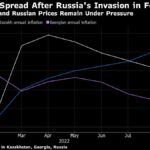
The tone was stern, and the message sober: Britain, according to its latest prime minister, “is facing a profound economic crisis.”
But more striking than the confidence with which Rishi Sunak proceeded to lay out his policy priorities was the casual manner in which he avoided facing an even deeper challenge – one that has defied three other Conservative prime ministers in six years and likely holds the key to his own success or failure in office.
It is the unfinished business of Brexit: finally deciding on the shape of Britain’s relationship with the 27 countries of the European Union, the trading bloc it voted to leave in a 2016 referendum.
And that is a conundrum with implications not just for Britain, but other populist political campaigns like Brexit: how to convert angry rhetoric and rhapsodic promises into workable, real-world policies.
For Mr. Sunak, resolving that puzzle is economically urgent, but politically daunting.
Britain’s ill-defined post-Brexit ties with the EU aren’t the main cause of the “profound economic crisis.” He rightly highlighted others: the war in Ukraine, the pandemic, and the “error” of his immediate predecessor, Liz Truss, in announcing a radically new economic blueprint that spooked the financial markets.
But Brexit is a key factor, too. It has dampened trade and foreign investment. It has fueled consumer price rises and skilled labor shortages. According to an official estimate, it is poised to shave 4% off Britain’s future gross domestic product.
And a range of unresolved Brexit-related issues could mean further trouble.
London and Brussels are still locked in a dispute over border checks between Northern Ireland, which is part of Britain, and EU-member Ireland. That carries the risk of an all-out trade war.
Nor has London agreed with the EU on how the two sides can ensure that the regulations governing their crucial financial services industries are compatible.
Mr. Sunak’s problem is that getting final agreement on the exact nature of Britain’s future relationship with the EU is not just an economic question.
It is, above all, political, with roots going back to the referendum.
The impetus for holding the plebiscite came from a passionately anti-EU minority inside the Conservative Party. The party’s then-leader, Prime Minister David Cameron, favored staying in. He was confident that, in a reasoned debate, Britain’s strong economic and trade interests in remaining part of the EU would carry the day.
Pro-Brexit leaders could not even agree on a shared vision of how Britain would organize its trade and economic affairs after leaving the EU. So the campaign became a broad-brush populist crusade, tapping into a whole range of economic and political grievances, promising the “sunny uplands” of a brighter future.
And Brexit won.
The margin was narrow, with more deprived areas of the country supporting Brexit, while Londoners and younger voters overwhelmingly opposed it. So did voters in Scotland, lending new energy to calls for independence from the United Kingdom.
The overall legacy was a country deeply, angrily divided over the issue – while Britain’s post-Brexit relationship with its nearest and largest trading partner was yet to be agreed upon, even among those in favor of leaving.
Successive Conservative prime ministers have tried to complete the process.
Theresa May sought a transition period during which existing arrangements would remain in place until a new relationship had been worked out, but failed to get a majority of members of Parliament to back her. Next came Boris Johnson, the leading voice on the Brexit campaign trail. He did get Britain out of the EU; in fact, his promise to “get Brexit done” won his party a thumping election victory in 2019.
But his deal with Brussels didn’t get it done. Key issues remained unresolved.
And then came Ms. Truss. She was the first leader with a fully coherent vision of post-Brexit Britain, dubbed “Singapore-on-Thames.” Unchained from EU ties, she believed, Britain could transform itself into a low-tax, low-regulation, business-friendly, high-skills economy to outcompete former EU partners, and strike new trade deals with economies such as India and the United States.
It wasn’t that plan itself that toppled Ms. Truss, making her the shortest-ruling prime minister in British history. Rather, it was the ill-prepared way in which her initial tax plan was sprung on the markets.
So now, it’s Mr. Sunak’s turn. He has yet to clarify his own vision of Britain’s post-EU future.
He does seem to share Ms. Truss’ view that low growth, low skills, and low productivity are the British economy’s major failings. But he does not appear to believe that “Singapore-on-Thames” is a realistic solution.
He may be hoping to put off resolving Brexit for now, since everyone is focused on the more immediate crisis.
But as a former finance minister, he is fully aware that the confusion over Brexit’s shape is causing damaging economic dislocations. And that until a final plan is agreed upon with the EU, those dislocations will only make it harder to recover from the crisis.
Related stories
Read this story at csmonitor.com
Become a part of the Monitor community




